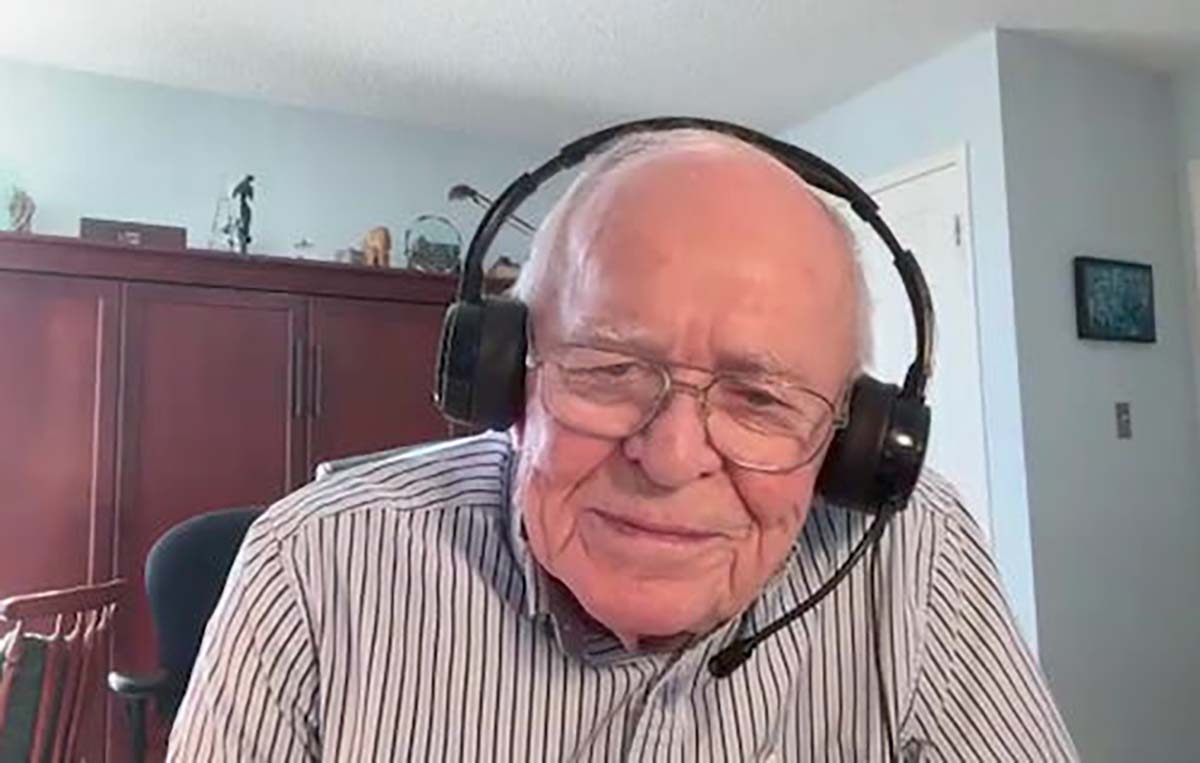As a parliamentarian, ambassador, and senator, Amb. Douglas Roche has been the leading peace activist in Canada for a generation. He recently reminisced about peace, disarmament, international law, UN reform and the interconnectedness of global challenges on the Project Save The World podcast.
Roche began his journey as a journalist in the 1950s, writing for Sign Magazine, a Catholic publication focused on social issues. His travels in Africa, Asia, and Latin America opened his eyes to the diversity of humanity and the need for global solidarity. His recognition that the majority of the world’s population is non-white, non-Western, and non-Christian has informed his advocacy for disarmament and social justice throughout his career.
After returning to Canada and entering politics, Roche was elected to Parliament in 1972, where he specialized in development issues. His involvement in the arms race and its implications for global development became a central theme in his work. He believed that military spending diverted essential resources away from critical areas like education, healthcare, and poverty alleviation. This conviction ultimately led him to focus on nuclear disarmament.
A Commitment to Disarmament
In 1984, When Roche left Parliament to dedicate himself fully to peace issues he was appointed the Canadian Ambassador for Disarmament. His role at the United Nations allowed him to champion nuclear disarmament and engage with global leaders on the critical need for arms reduction. Roche described a pivotal moment during his tenure when he advocated for Canada to reject the United States’ Strategic Defense Initiative (SDI), demonstrating the potential for Canada to influence global disarmament dialogues.
During those years, Douglas Roche became a prominent global leader in the realm of peace activism, particularly known for his extensive work at the United Nations (UN) and his leadership in the Middle Powers Initiative (MPI).
The Middle Powers Initiative is a coalition of organizations and individuals from various countries that aims to promote global nuclear disarmament. Established in the late 1990s, the MPI focused on leveraging the influence of middle-power countries—those that do not have the military might of superpowers but are influential in international diplomacy. Roche played a key role in its formation, believing that these nations could serve as mediators and advocates for disarmament, especially in light of the nuclear threats posed by larger nations like the U.S. and Russia.
The “Golden Age” of Disarmament
Roche’s tenure at the UN coincided with what he considers a golden age for disarmament efforts, particularly – the late 1980s and early 1990s. This period coincided with significant geopolitical changes, including the end of the Cold War and the warming of relations between the West and the Soviet Union. During this time, there were substantial negotiations leading to key treaties, such as the Intermediate-Range Nuclear Forces Treaty (INF), which eliminated a category of nuclear weapons. Roche argues that both U.S. and Russian officials were genuinely engaged in pursuing disarmament, spurred by a mutual recognition of the catastrophic potential of nuclear war.
Roche contends that it has been primarily the Western countries, particularly the United States, that have blocked progress toward nuclear disarmament. He cites the failure of the U.S. to fully embrace the disarmament commitments outlined in the Nuclear Non-Proliferation Treaty (NPT), especially the pledge made in the 2000 review conference to work toward complete nuclear disarmament. This commitment has not materialized into substantial policy changes, according to Roche, who points out that the U.S. has focused instead on modernizing its nuclear arsenal, spending approximately $1.7 trillion over the next three decades on nuclear weapons.
Roche’s analysis also reflects broader critiques of the U.S. approach to nuclear policy, arguing that the pursuit of military dominance has overshadowed genuine efforts toward disarmament. For instance, the 2018 U.S. Nuclear Posture Review, which called for a more robust nuclear arsenal, not only undermines international security but also impedes the progress of multilateral disarmament agreements, which rely on mutual trust and cooperation among nations.
International Law
Roche emphasized that, to handle conflicts, the UN requires an increased capacity to enforce international law/ However, he acknowledged the UN’s limitations. Although there are now two vitally necessary courts – the International Court of Justice and the International Criminal Court, they are both operating without jurisdiction.
“If you run a red light in your car,“ said Roche, “you have to go to court. Local laws are enforced, but you can threaten to use nuclear weapons, and there’s no enforcement. We haven’t elevated humanity enough. We’re going through a dark valley right now on this long journey from a culture of war to a culture of peace.”
UN Reform
The veto power held by the five permanent members of the UN Security Council also hinders collective action and accountability. Roche points out that the United Nations could not have been founded at all in that particular historical period, had the veto not been built into the charter for the five most powerful founding nations. And for nearly eighty years, the UN’s achievements have far outweighed its deficiencies, especially with regard to human rights. However, the UN still can’t stop war – because the nations themselves will not stop it, as shown by the UN’s failures in Rwanda and Srebrenica. Still, says Roche, “there is not a person on the planet who has been affected in positive ways, one way or another by what the United Nations does.”
There is a new push for a reform of the Union. Roche is somewhat encouraged by a recent resolution requiring any permanent member using its veto power to explain its decision to the General Assembly. Russia and the United States have both appeared before the June Assembly.
This step represents a modest but important shift toward greater transparency and accountability within the UN system. The United States has said that it will accept two African states as permanent members of the Security Council, and India, Brazil, Japan and Germany are on the list to become permanent members of the Security Council.
The Culture of Peace
Roche explained that the “Culture of Peace” framework, established by the UN in the year 2000, emphasizes non-violence, education, and respect for human rights. The decade from 2000 to 2010 was to be a decade for the culture of peace. There were many programs – youth, women’s programs, education programs to gradually get people to understand that new possibilities for peace are coming as a result of the end of the Cold War.
“What happened? I will tell you what happened!“ said Roche. “The terrorists struck! The terrorist attacks led to the war on Afghanistan and then the subsequent war in Iraq, and led to a resurgence of militarism… Today, military policies are driving foreign policies, rather than the other way around.”
The Interconnectedness of Global Challenges
Roche and Spencer discussed the interconnected nature of today’s emerging global “polycrisis”– climate change, nuclear proliferation, and emerging technologies like artificial intelligence (AI). He expressed concern that AI and other technologies must be accompanied by ethical safeguards to prevent misuse.
Roche argued that the crisis makes the need for disarmament more urgent than ever. The allocation of resources toward military expenditures undermines efforts to address pressing issues like climate change, which disproportionately affect vulnerable populations worldwide. He advocated for a holistic approach that integrates disarmament, environmental sustainability, and social justice.
The Global Security Institute is dedicated to strengthening international peace and security based on co-operation, diplomacy, shared interests, the rule of law and universal values. Our efforts are guided by the skills and commitment of our team of former heads of state, distinguished diplomats and politicians, celebrities, religious leaders, Nobel Peace Laureates, disarmament and legal experts, and concerned informed citizens. Our focus is on controlling and eliminating humanity’s greatest threat – nuclear weapons.







